
What is Constipation?
Constipation is a common problem experienced by many people in which bowel movements occur less often than usual. The stool is often hard and dry with a sense of incomplete emptying after a bowel movement.
What are the different types of constipation?
There are several types of Constipation:
Primary Constipation - Also referred to as functional or idiopathic constipation which occurs without any clear cause.
- Normal Transit Constipation: Normal Faeces consistency and transit time through the digestive tract, symptoms generally include abdominal bloating and pain.
- Slow Transit Constipation: As stools take longer time to pass through the colon, hence it results in reduced frequency of bowel movements.
- Outlet Constipation: Defect in the pelvic floor muscle functioning and thus resulting in difficulties with passage of stool.
Secondary constipation - That occurs as a result of lifestyle factors, an underlying illness or medications.
What are the complications that constipation can lead to?
Constipation complications include:
-
Hemorrhoids
-
Rectal bleeding
-
Anal fissures (tears in skin around the anus)
-
Rectal prolapse (the large intestine detaches inside the body and pushes out of the rectum)
-
Fecal impaction (hard, dry stool is stuck in the body and unable to be expelled naturally)
Signs & Symptoms
Constipation signs and symptoms include:
Fewer than three stools or bowel movements per week
Having lumpy or hard stools
Straining on the toilet during bowel movements
Feeling as though there's a blockage in the rectum
Feeling of incomplete defecation
Removing the stool with a finger
Fewer than three stools or bowel movements per week
Having lumpy or hard stools
Straining on the toilet during bowel movements
Feeling as though there's a blockage in the rectum
Feeling of incomplete defecation
Removing the stool with a finger
What are the causes of Constipation?
Various causes of constipation are as follows:
Diet pattern with low fibre content.
Less intake of liquids like water and juice.
Certain medicines like painkillers, antacids that contain aluminum, antispasmodics, antidepressants, iron tablets, diuretics can slow passage of bowel movements.
Lack of physical activity.
Spasms of the colon can delay the time in which the intestinal contents move through the intestine, leading to constipation.
Traveling long distances causes changes in lifestyle, schedule, diet, and drinking water.
Certain hormonal disturbances, such as an underactive thyroid gland, can produce constipation.
Pregnancy is another common cause of constipation and reasons may be due to hormonal changes during pregnancy.
How to diagnose constipation?
- The doctor will ask for your medical history which includes duration of symptoms, frequency of bowel movements, consistency of stools, presence of blood in the stool, eating and toilet habits, medication & level of physical activity or exercise.
- Routine blood, urine, and stool tests.
- Colonoscopy allows your doctor to examine the entire colon with a flexible, camera-equipped tube.
- Sigmoidoscopy may help detect problems in the rectum and lower colon.
- Barium enema x-ray helps with viewing the rectum, colon, and lower part of the small intestine to locate any problems.
How to prevent constipation?
General measures to prevent constipation:
- Include plenty of high-fibre foods in your diet, including beans, vegetables, fruits, whole grain cereals and bran.
- Eat fewer foods with low amounts of fibre such as processed foods, and dairy and meat products.
- Drink plenty of fluids (1.5 litres of water per day).
- Regular exercise.
- Manage stress levels through meditation and yoga.
- Don’t ignore the urge to pass stool.
- Allow sufficient time for defecation.
- Try to create a regular schedule for bowel movements.
- Avoid medications causing constipation.
How to treat constipation?
Healthcare provider may prescribe laxatives to treat constipation. However it is suggested that you work alongside your medicines to adopt some healthy lifestyle habits, including adopting a healthy diet, to resolve constipation.

